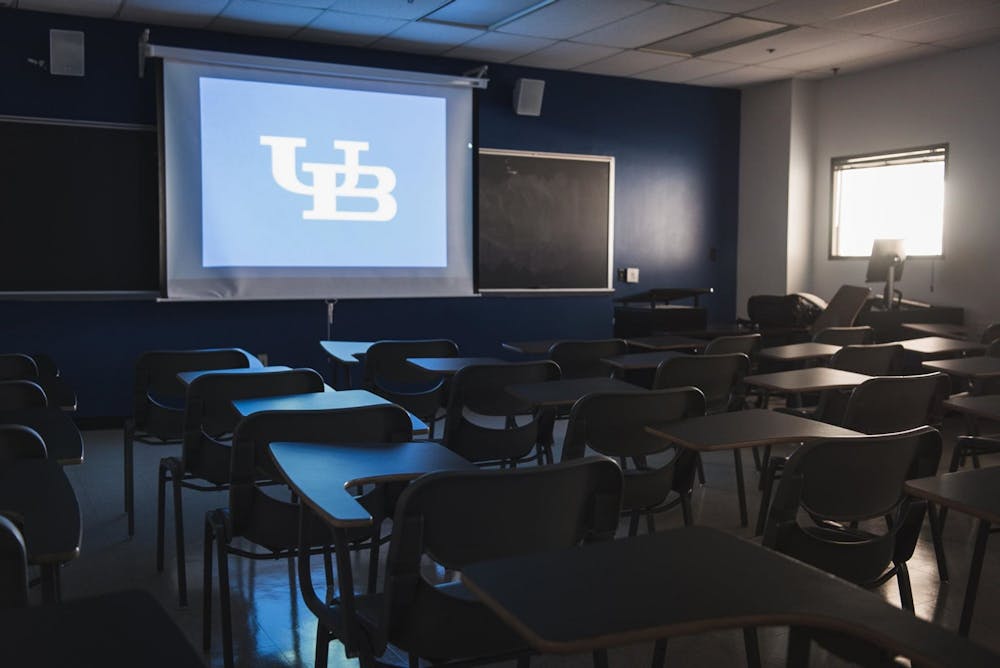Jannat Inqiyad said that in order to complete the online work for her classes, she needs to leave her home since she doesn’t have internet access.
Inqiyad, a sophomore health and human services major, said her family had to “sacrifice” internet connection to afford essentials after the family lost its main source of income due to COVID-19. Now, she needs to go to public libraries to complete her remote coursework and said she doesn’t feel safe leaving her house because she has family members and friends who are hospitalized with COVID-19.
“Unfortunately, I haven’t been able to get my work done,” Inqiyad said. “I’ve gone to campus twice to try and complete work but I feel unsafe and don’t want to sacrifice my health while I have family members and friends who are currently in the hospital due to the virus.”
Inqiyad isn’t the only student who has had trouble adapting to online learning.
According to a UB survey, 56.08% of students are “very uncomfortable” or “somewhat uncomfortable” completing their coursework online. The survey, conducted from March 18-30, asked the student body -- 3,048 of which completed it -- about their experiences transitioning to “distance learning.” Roughly 17% reported they will be able to “successfully learn the course content” in all of their classes, while 6.82% said they won’t be able to learn the content in any of their classes.
Assistant Vice Provost for Educational Effectiveness Carol Van Zile-Tamsen wrote in an email that UB hopes individual instructors will use the information to make adjustments. UB’s “distance learning” policy will continue into the summer term, but administrators haven’t yet announced a plan for the fall. Provost A. Scott Weber will send an email “in the next day or so” about his “planning structure” for the fall semester, according to a Monday morning email from UB President Satish Tripathi.
Tori Kesselman, a sophomore health and human services major, said she hopes that UB offers in-person classes again soon and that remote instruction “defeats the purpose of the college experience.”
“I miss my friends and classmates,” Kesselman said. “I miss going to the library every day to get work done with my friends, having online classes defeats the purpose of the college experience.”Some students say they have sick family members and don’t have time to think about their work, are dealing with financial issues, or feel “distance learning” is more time consuming than in-person classes.
Since UB encouraged students to leave campus for the rest of the semester, 93.22% of students now access their remote coursework off campus, according to the survey.
Fakaradin Floyd, a junior computer science major, said his laptop recently broke so he’s having trouble completing his coursework. Floyd said he’s been able to keep up with his math and pathways classes, but his computer science courses are difficult without a computer.
UB sent an email to students on April 15 notifying students that UBIT will offer students SUNY computers for loan. So far, 36 students have requested laptops and their requests are being fulfilled, according to UBIT. Pell-eligible students can continue to apply.
Floyd said SUNY laptops weren’t available for him until it was too late to recover his grade.
“The loan program doesn’t offer immediate help until April 26, almost a month after remote classes started,” Floyd said. “That makes it almost impossible to recover a grade in some classes that are oriented around using a computer.”
Jordan Forstadt, a freshman nursing major, has access to technology, but said it’s “easy to fall behind” in remote classes. She said it’s hard to concentrate at home.
“Although it does allow more flexibility, it is easy to become lazy and procrastinate watching your lectures or saving work until last minute because you are in your home and it can be hard to concentrate,” Forstadt said. “Since now I feel like I have all the time in the world, I tend to save things for the last minute and have to rush to get it done and therefore I am not putting as much effort into my work as I should be.”
While 72.95% of students indicated that “most” or “all” of their instructors “demonstrated a willingness to accommodate challenges during this time,” over 48% of students indicated that “distance learning” is more time-consuming than “the traditional format.”
Kesselman said some of her professors lightened the workload for her classes, but others increased the workload, which she said makes the adjustment to remote instruction “more stressful and overwhelming.”
“The idea of this remote learning is to try and run your class as efficiently and similarly as possible to the in-person classes, so it’s beyond me why any professor would increase the workload for students,” Kesselman said.
Kesselman said she understands the material in her classes better during in-person classes and finds it difficult to ask questions online.
“There is something about in person teaching that allows me to understand the material better,” Kesselman said. “Some of my teachers don’t even hold Zoom lectures and just post powerpoints on UBLearns. If I have a question, I need to email my professor and wait about 24 hours for them to respond, as opposed to getting an answer right away after class or at office hours.”
Robert Miletich, chair of the Faculty Senate, wrote in an email that the Faculty Senate will use the survey to identify and address problems with online learning, but said UB doesn’t currently have an adequate online replacement for in-person testing.
“An area which requires further thought is testing and assessment,” Miletich wrote. “No digital solution we have currently is adequate. Class structures may need to be redesigned.”
Jake Raher, a senior finance major, “struggled” with an online test and said he is “in danger” of not graduating with his intended finance concentration. The test was proctored over Zoom, which he said was “distracting.” He said students taking the same class with other professors say they only have to do “take-home problems” for their final grade.
“Everyone was required to keep their mic and cameras on during the test which was distracting because people kept making noises,” Raher said. “The test itself was compressed onto four pages in Microsoft Word, making it very hard to read and as a student who struggles for time in this class it made it more difficult to keep track of what question I was on after having to skip around a lot of the test.”
Miletich said Weber “organized a number of interconnected committees” to address solutions moving forward.
“The provost has organized a number of interconnected committees, composed of administration and the Faculty Senate, to address UB remote learning solutions and redesign going forward. The future is uncertain, but if you know of somebody holding the perfect crystal ball, please tell me.”
Editor's note: Jake Raher was able to successfully complete his courses and graduate from UB in May 2020.
Chloe Ferney and Vijay Maheshwari contributed reporting to this story.
Julian Roberts-Grmela is a senior news editor and can be reached at julian.grmela@ubspectrum.com and on Twitter @GrmelaJulian.

Julian Roberts-Grmela is a senior news editor for The Spectrum and an English and philosophy major. His favorite book is “White Teeth” by Zadie Smith and he hopes that one day his writing will be as good as hers.





